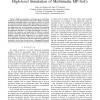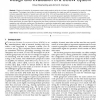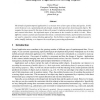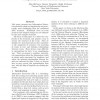110
Voted
SAMOS
2010
Springer
14 years 11 months ago
2010
Springer
—High-level simulation and design space exploration nowadays are key ingredients for system-level design of modern multimedia embedded systems. The majority of the work in this a...
102
click to vote
JSS
2010
14 years 11 months ago
2010
There is a general consensus on the importance of good Requirements Engineering (RE) for achieving high quality software. The modeling and analysis of requirements have been the m...
101
click to vote
ISVC
2010
Springer
14 years 11 months ago
2010
Springer
An experimental analysis of three acquisition scenarios for face recognition at a distance is reported, namely: close, medium, and far distance between camera and query face, the t...
109
click to vote
TSE
1998
15 years 13 days ago
1998
—Design and evaluation of groupware systems raise questions which do not have to be addressed in the context of single user systems. The designer has to take into account not onl...
122
Voted
TSE
1998
15 years 13 days ago
1998
—Scenarios are increasingly recognized as an effective means for eliciting, validating, and documenting software requirements. This paper concentrates on the use of scenarios for...
74
Voted
PUC
2002
15 years 13 days ago
2002
: Scenarios in HCI are widely used and discussed as written or visual narratives. In this paper, we discuss fruitful conditions for the creation and performance of scenarios partic...
83
Voted
NGC
2002
Springer
15 years 13 days ago
2002
Springer
Scenario analysis is often used to identify possible chance events. However, no formal, computational theory yet exists for scenario analysis. In this paper, we commence developme...
DEBU
2002
15 years 18 days ago
2002
The domain of spatiotemporal applications is a treasure trove of new types of data and queries. In this work, the focus is on a spatiotemporal sub-domain, namely the trajectories ...
85
Voted
COLING
2002
15 years 18 days ago
2002
This paper presents new Information Extraction scenarios which are linguistically and structurally more challenging than the traditional MUC scenarios. Traditional views on event ...
141
Voted
IWC
2007
15 years 21 days ago
2007
In recent years, there has been great interest in scenario-based design and other forms of user-centred design. However, there are many design processes that, often for good reaso...




